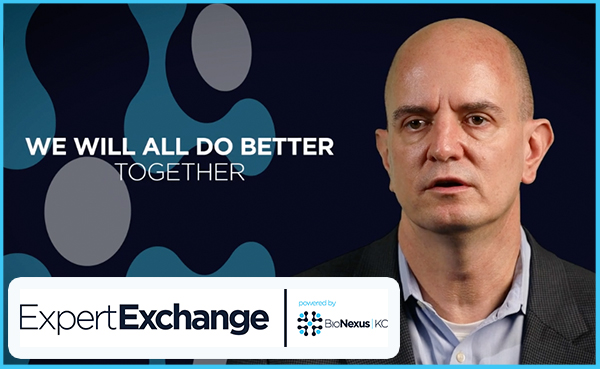
All creatures have a spectacular arrangement of cells. When these cells are at their best, the body functions properly. The opposite is true, however, when these cells decline. For Dr. Doug Myers, Physician and Section Chief of Bone Marrow Transplantation at Children’s Mercy, his objective is to assist and support families when this cellular misfire affects children with cancer. Myers focuses on modifying cell treatments and chimeric antigen receptor (CAR) T-cells to target pediatric cancer.
Myers’s motivation is simple and profound, he has seen too many parents leave the hospital without their kids. This sense of urgency has guided his career and work focused on clinical trials of cell therapies targeting cancer. Prior to moving to Kansas City, Myers worked in Houston on one of the first human trials of CAR T-cells. That involvement expanded upon relocating, as the Kansas City region provided an excellent collaborative opportunity to partner with local laboratories to develop cell therapies. “The CAR T-cell therapies are kind of like an investment portfolio, you need to diversify the types you use because certain strategies may not work as well as you think,” Myers said.
The CAR T-cells were originally developed in the late 1980’s but it wasn’t until recently that they were commercialized. For Myers, his role is understanding how CAR T-cells work to kill cancer, expand on that, and find novel ways to make them more effective. “We build on the work of others. If we can make the CAR T-cells a little more aggressive when they arrive at a tumor, we can get them reinvigorated and they will target the cancer,” Myers said.
By using technology that is already commercialized, it provides an opportunity for Myers to make an immediate translational difference. His laboratory at Children’s Mercy moves targeted therapies from bench to bedside to affect a wide array of patients. “Through recruiting and partnership, we see an opportunity to work in conjunction with an immunotherapy center that would expand the treatment to patients with solid organ transplant tolerance, autoimmune disease, things like that,” Myers said. With this focal point, he is able to better collaborate with the University of Kansas and other institutions to expand the research footprint in the region.
Myers acknowledges his success at Children’s Mercy is a result of the atmosphere that they have built and provide. “I see the need to collaborate and that’s more fun than trying to accomplish things on your own. There’s definitely a feeling of teamwork here and that goes a long way to being satisfied with your job,” Myers said. “We’ve built collaborations involving things as divergent as a cardiology lab at Children’s Mercy helping the T-cell lab at the University of Kansas Medical Center to help both adults, children, and the animals at Kansas State University by collaborating with them through some of their animal models.”
This type of immunotherapy research may focus on pediatric cancer, yet its benefits can be seen with targeting cancer in adults and even animals. One Health is a collaborative approach of leveraging the linkage between human health, animal health, and the environment – a unique strength in the Kansas City region. “If we are doing animal testing as a necessary part of developing human treatments, why wouldn’t we get the benefit to the animals as well,” Myers said.
Myers interest in science emerged in his 9thgrade biology class when his teacher encouraged the class to imagine and draw the appearance of a virus. Myers was captivated in that moment when the teacher explained what a virus did and how they attacked the body.
There is also a foundation of support and hope of positive outcomes that Myers appreciates. He recalls an allogeneic stem cell transplant that carried a high price tag for the hospital but stood a good chance of helping a pediatric cancer patient. “I saw them coming from a distance, and I thought, oh no. They are going to tell me I can’t do this; we can’t take this risk” Myers said. Instead, they listened to the science, heard the potential impact it could have for this child, and committed to making that difference “I knew from that moment on that I was going to be supported,” Myers said.
Beyond cancer and illness, the motivation for Myers is to improve lives. His work has the ability to have an immediate impact and with strong collaboration, he will likely see more kids going home with their parents.